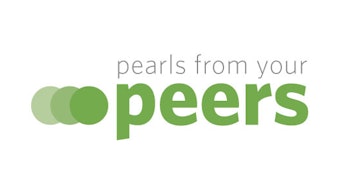Why You Should Invest in ENT PAC Today
ENT PAC opens doors to lawmakers, but contributions lag far behind similar specialties—weakening our collective voice.
Brad Gruehn, Senior Manager, Congressional & Political Advocacy

The answer: Yes, we could. However, this would be like trying to put out a house fire with a garden hose. We would be much less effective.
The Academy Can't Do It Alone
The Academy understands the importance of a strong advocacy program and has invested in staff and resources to amplify your voice in Washington. But the Academy can't make direct political contributions, nor should it. That's why the ENT Political Action Committee (PAC) was created 30 years ago.
ENT PAC is funded* entirely through individual, voluntary contributions from domestic AAO-HNS members. These funds support bipartisan candidates for Congress who understand and champion the interests of otolaryngologist-head and neck surgeons.
Access Equals Influence
Simply put, ENT PAC provides access. It puts us in the rooms with lawmakers who shape healthcare policies. The more AAO-HNS members contribute, the more access we have. The more access we have, the more opportunities we have to explain directly to members of Congress the unique challenges otolaryngologist-head and neck surgeons face in delivering high-quality care.
To be clear, there is never a quid pro quo with a lawmaker because of a contribution ENT PAC makes to their campaign. ENT PAC support opens doors and gives us critical opportunities to make compelling and persuasive arguments to gain their support on our issues. It doesn't always mean a legislator will give us what we want. However, one thing is certain: if we're not in the room to ask, the answer is always no.
The Cost of Sitting Out
Look, I get it. Politics can feel frustrating, messy, and exhausting regardless of your political views. You want to do your job, treat your patients, take care of your family. But there's an important reality about healthcare they don't teach in medical school: The federal government influences nearly every aspect of medicine.
As Annette M. Pham, MD, Chair of the Otolaryngology Private Practice Section, explained in her article in the Bulletin earlier this year, advocacy is not an option. Program cuts, value-based care models, and a dwindling Medicare Trust Fund will continue shaping the future of medicine, potentially at your expense. Unfortunately, healthcare policy in Washington is often a zero-sum game. This is especially true for Medicare physician payments: When one group gets more, another must get less.
If we're not in the room advocating for otolaryngologist-head and neck surgeons, no one else will.
A Recent Example
When the U.S. Department of Health and Human Services (HHS) released its Make America Healthy Again (MAHA) report in May 2025, it singled out two otolaryngology-head and neck surgery procedures (adenotonsillectomy for children with sleep apnea and tympanostomy tubes) as providing "no benefit." These were the only surgical procedures called out in the entire report.
You might have expected the broader medical or surgical community to push back against the misleading references and mischaracterizations. In reality, no one outside the otolaryngology community spoke up for us. The Academy and the American Society of Pediatric Otolaryngology stood up, issuing a strong public condemnation and highlighting the evidence-based value of these procedures.
That experience underscored a hard truth: When it comes to protecting the specialty, we are often on our own.
What We're Fighting For
At political events throughout the year, ENT PAC ensures U.S. lawmakers hear directly from us about:
- Fair Medicare physician payments
- Prior authorization reform
- Preserving physician-led hearing healthcare teams
- Preventing permanent hearing loss in infants
- Easing the student loan burden on medical residents
- Providing a pathway to train more medical students
Make no mistake—competition for lawmakers' time and attention is fierce. Even more concerning, we're falling behind other specialty societies of comparable size in securing the resources needed to compete effectively.
The Numbers Tell the Story
Within healthcare, eight groups raise over $1 million annually:
- American Academy of Dermatology
- American Association of Orthopaedic Surgeons
- American College of Emergency Physicians
- American Dental Association
- American Medical Association
- American Optometric Association
- American Society of Anesthesiologists
Another five groups raise between $500,000 and $1 million annually:
- American Academy of Ophthalmology
- American Association of Nurse Anesthesiology
- American College of Radiology
- American Osteopathic Association
- American Physical Therapy Association
Then there's everyone else—including ENT PAC. To put our position in perspective, here's how we compare with other surgical specialty PACs representing similar or smaller membership bases:

As you can see, despite having a larger potential donor pool, ENT PAC lags far behind. That gap limits our ability to protect your interests and your profession.
The Bottom Line
If you want to empower advocacy in Washington, you need to invest in ENT PAC. It's not only an investment in the profession but an investment in yourself and your patients. The stronger ENT PAC becomes, the stronger your voice is in Washington.
Click here to invest in ENT PAC.
*Contributions to ENT PAC are not deductible as charitable contributions for federal income tax purposes. Contributions are voluntary, and all members of the American Academy of Otolaryngology-Head and Neck Surgery have the right to refuse to contribute without reprisal. Federal law prohibits ENT PAC from accepting contributions from foreign nationals. By law, if your contributions are made using a personal check or credit card, ENT PAC may use your contribution only to support candidates in federal elections. All corporate contributions to ENT PAC will be used for educational and administrative fees of ENT PAC, and other activities permissible under federal law. Federal law requires ENT PAC to use its best efforts to collect and report the name, mailing address, occupation, and the name of the employer of individuals whose contributions exceed $200 in a calendar year.






